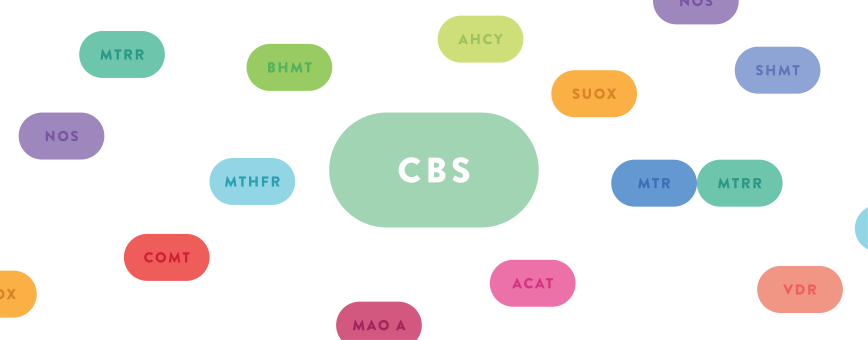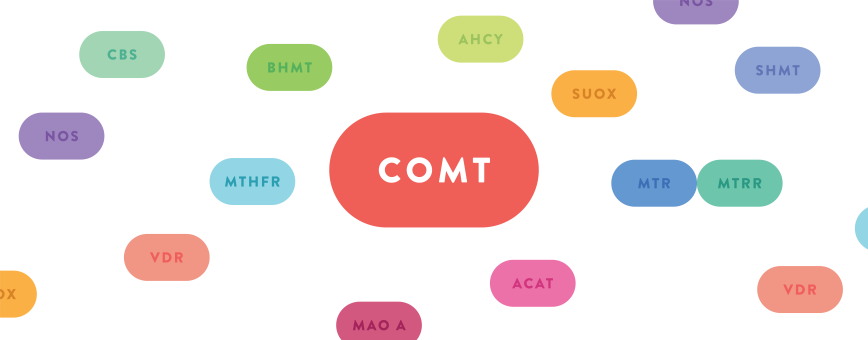The methionine synthase reductase (MTRR) gene gives your body instructions on how to make the enzyme methionine synthase reductase. This enzyme is important for folate metabolism and cellular methylation.1
MTRR works together with methionine synthase (MTR) to recycle homocysteine back into methionine.2 It does this by regenerating methylcobalamin B12 so that MTR is able to utilize it.
Mutations that impair the function of MTRR have secondary consequences on the activity of the MTR gene. Even if you have no mutations in MTR, if MTRR is not able to function properly, MTR will not have enough methylcobalamin B12 to work optimally in the methylation cycle.
The combination of a mutation in MTRR, which compromises its ability to regenerate methylcobalamin B12, and an MTR mutation that allows your body to use B12 at an accelerated rate, can result in extremely depleted levels of methylcobalamin B12 in the body.
MTRR and MTR are part of what is commonly referred to as the “long route” of the methylation cycle. When MTRR or MTR do not function properly, or when there is not enough methylcobalamin B12 for the body to use, methionine is not effectively produced via the “long route.” The result of this is more pressure on the “short route” of the methylation cycle, which involves the BHMT gene.
MTRR polymorphisms may have cumulative effects with MTHFR/C677T, MTR, AHCY, or CBS polymorphisms.
There are six SNPs in MTRR that Dr. Amy looks at in the DNA Nutrigenomic Test: A66G, H595Y, K350A, R415T, S257T, and 11.
Dr. Amy has observed that the MTRR 11 SNP has a different impact on the methylation cycle than the MTRR SNPs described above. Those who are MTRR 11 (+/-), and particularly those who are MTRR 11 (+/+), tend to have issues with intestinal permeability and leaky gut.
A Note From Dr. Amy
Extremely low levels of B12 create a roadblock in the methylation pathway between methionine and homocysteine. This roadblock requires a nutritional bypass to restore pathway function.
I’m not sure if I have a MTRR mutation, how can I find out?
Our DNA Nutrigenomic Test identifies a custom panel of 30 single nucleotide polymorphisms (SNPs), designed by Dr. Amy. This panel tests for 6 different MTRR variations; A66G, H595Y, K350A, R415T, S257T, and 11.
While there are thousands of genes and SNPs that can be examined, Dr. Amy has designed The DNA Nutrigenomic Test panel to focus on 30 SNPs that are part of the methylation cycle. This is a key nutritional pathway in the body that is central to health.
Many of the SNPs in Dr. Amy’s custom panel are in the control or regulatory portion of the gene, meaning these SNPs can have a significant impact on your health. These include some of the more unique SNPs on this panel and are not always covered by other DNA profile tests.
The analysis includes supplement suggestions based on personalized results and provides a comprehensive assessment of the methylation cycle. Proper function of the methylation cycle is essential for several key pathways in the body. When genetic mutations, or “weaknesses”, are present in this cycle, there may be increased risk factors for a range of health concerns. To learn more about the DNA Nutrigenomic Test and The Yasko Protocol, read our Getting Started Packet here.
How can I support my MTRR mutation?
Nutrigenomic pathways are different between individuals and proper supplementation can help support specific imbalances. Holistic Health International offers a variety of supplements to support different MTRR mutations within the SNP Support Category here.
Sulfite Sensitive was originally named after those with MTR/MTRR/SUOX mutations. This formula contains molybdenum and B12 to provide support for individuals with low levels of manganese and/or molybdenum, as well as individuals with high levels of taurine and/or sulfur.
You do not need to use every supplement listed in each category! Supplements are provided as options to discuss with your own health care professional, to gradually add in as you feel they are needed, and for additional consideration based on biochemical test results.
The beauty of looking at targeted SNPs in the methylation cycle is that it’s a nutritional pathway, meaning if you find a mutation or imbalance in your system, you have ways to support or bypass them.
The information expressed on this webpage does not constitute an attempt to practice medicine nor does it establish a doctor-patient relationship. Content on the site is for informational and educational purposes only. The information expressed is not meant to replace you working with a physician or health care practitioner.
Information and statements have not been evaluated by the U.S. Food & Drug Administration (FDA) and are not intended to diagnose, treat, cure or prevent any disease or be used as the basis for treating a particular symptom or disease. Any products discussed or endorsed are not intended to diagnose, treat, cure or prevent any diseases or be used as the basis for treating a particular symptom or disease. If you have specific healthcare concerns or questions about the products displayed, contact your licensed healthcare professional for advice or answers.
References:
1. MTRR 5-methyltetrahydrofolate-homocysteine methyltransferase reductase [ Homo sapiens (human) ]. 2023, April 9. Accessed 2023, April 25. https://www.ncbi.nlm.nih.gov/gene/4552
2. Q9UBK8 · MTRR_HUMAN. Accessed 2023, April 25. https://www.uniprot.org/uniprotkb/Q9UBK8/entry






